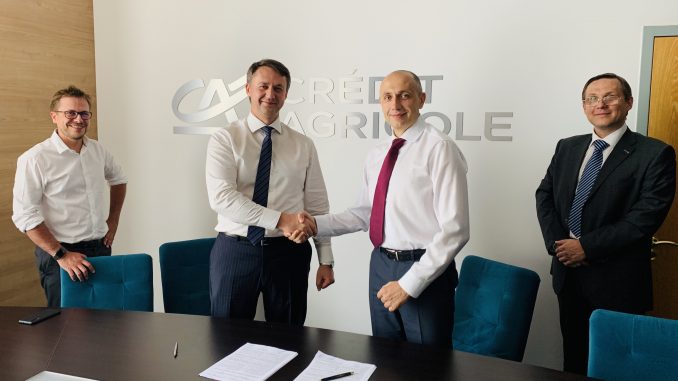
Ukraine catches up with Western financial markets. Now it is time for leasing. Learn more from the interview with Credit Agricole bankers.
In the autumn 2020, the Ukrainian subsidiary of one of the largest banking groups of Europe – Credit Agricole (France) – launched an alternative corporate finance product: financial leasing. Why have bankers decided to expand their product range despite the pandemic and new confinement measures, what potential do they see in the Ukrainian leasing market, and can this type of finance replace classic loans?
Aleksandre Tchesnakoff, Deputy Board Member of Credit Agricole Bank, and Yurii Vasylenko, Head of Leasing Division, answered to these questions.
– How did the Covid pandemic affect the demand for lending products?
Aleksandre Tchesnakoff: Our Credit Agricole Group colleagues told us that during the first wave of COVID-19, customers of European banks tried to utilize the available credit limits as much as possible. In Ukraine, it was the other way around: businesses tried, where possible, to get rid of credit liabilities. I think, it is due to their prior experience of working in crisis. The first reaction of entrepreneurs in such situations is to become “independent” and not to rely on lenders. However, starting from June, we began to recover the level of activity of the past year.
Yurii Vasylenko: Many of our supplier customers expect that they will manage to cover the gap of the second quarter and to meet the targets of this year. Growth expectations for 2021 are clear for everybody: companies understand that the market cannot stagnate forever.
– Has your understanding of a “good customer” changed due to the coronacrisis?
Tchesnakoff: Nothing related to compliance and ethics has changed. We want our clients to share our understanding of business values. In terms of risks, we communicated that Credit Agricole Grup was ready to support its customers in times of crisis. We became more flexible, we took the situation into account, and understood that it might affect the financial positions of our clients. Our part of the job is to help our long-term partners go through this period as smoothly as possible.
– This autumn, Credit Agricole began to provide finance under leasing programs. What is behind this decision: is it a response to changes in the structure of customer demand or the requirement of crisis times?
Tchesnakoff: We started to prepare ourselves to entering this market segment few years ago: it was already clear that Ukraine had a big potential for leasing development. Credit Agricole has a powerful expertise in this area: there is a dedicated group of companies, Credit Agricole Leasing and Factoring, that deals with leasing in Europe. Ukrainian market of lease services has a good growth potential and we plan to become one of its leaders. Currently, there are only few large banking players in this market.
Vasylenko: Credit Agricole Ukraine is the leader in car lending and serving agrarian companies. This type of finance represents almost a half of the total corporate loan portfolio. Our customers, including large agroholdings, really wondered when we would start dealing with leasing. Thus, this is an absolutely logical step to business expansion and addition of another important element to the product range of the bank. First and foremost, the product was developed to satisfy the demand of our current customers and, of course, to attract new ones.
– It is relevant to say that for Ukrainian companies, leasing can become a kind of alternative to classic loans?
Vasylenko: In the course of leasing development and launching, we agreed that there should be no internal competition between products of the bank. “Cannibalization” between classic loans and leasing is unacceptable. Our task is to increase possibilities for the customers, offer alternative ways to acquire machinery and equipment, and ensure the most favorable and beneficial terms of both products. Customers will choose themselves what fits them the best depending on their needs and business models.
– What is the advantage of leasing, in your opinion?
Vasylenko: This product is rather broad, and additionally to finance, it may include other services and outsourcing such as, for example, insurance of lease items. The task of the bank as of the lease item owner is to offer the best tariffs of insurance companies. The customer will not be left alone if the loss occurs: the lessor will always support them in settlement of the incident. Moreover, while formalizing the lease, the bank will register vehicles or machinery (harvester, tractor, trailer, universal loader, or other types), payment of taxes and duties. The bank can also arrange a discount with the supplier. The customer will always have a choice: a loan or leasing. Our job is to ensure benefits included to leasing on top of finance.
– What is the target audience for leasing in Ukraine?
Vasylenko: We are not particularly limited in this respect. We target all legal entities that meet our basic requirements: two years of operation in Ukraine, financial statements for the same period, meeting compliance requirements, compliance with ethical and business conduct standards. At the first stage, we will not cooperate with private entrepreneurs and private individuals. However, we see future potential in this market segment as well.
– If we focus of leasing market in Ukraine, what scope are we talking about?
Vasylenko: We built our analysis based, inter alia, on the data of such reputable organizations as the European Leaseurope and the Association of Ukrainian Lessors. According to the latest researches, only 3-4% of capital investments are represented by leasing. In Europe, this indicator reaches 30%. If we talk about the amounts, the annual leasing market is about UAH 15 billion in Ukraine. This is very far from the potential maximum. If UAH 15 billion means 3-4%, while the normal level for Europe is 30%, we can only imagine the approximate potential of our market. Even over the short period of time that passed after the launch, we could see a substantial interest not only of the customers, but also of vendors and dealers.
How can a relatively weak demand for leasing in Ukraine be explained? New players began to enter the market only in the recent years while there was no development before. Why?
Vasylenko: The first thing I would like to mention is the need to update the profile legislation. The second thing is that up until recently, there was an uncertainty about recording of lease items by banks: could they be carried as collateral or should they be fully provisioned. Now, the NBU has clarified this issue, which made the lives of market players much easier and allowed new participants to enter. I would like to additionally note a mentality issue: in Ukraine, there is a traditional belief that it is better to own than to lease. But now we can observe that the customers change this approach and understand that leasing is more profitable sometimes. For example, when you use the machinery, it gradually fails to function and should be upgraded, sold, which consumes additional resources and bears additional risks.
– What risks that may prevent leasing development in Ukraine could you mention?
Tchesnakoff: First of all – the legislation. Transfer of leasing market supervision to the NBU was a very positive development. However, there are still discussions on the revised Law on Financial Leasing. In my opinion, we are too far from the agreement on the wording that would be satisfactory for everyone.
Vasylenko: We mean the draft law No1111 whose wording is being discussed for the second reading. Now, the market operates on the basis of the law enacted 20 years ago. We hope that discussion that involves market players, Association of Lessors, the National Bank will soon be completed, and this will trigger further market development. We hope that the second reading will take place at the beginning of the next year.
– Before the launch of leasing products, Credit Agricole carried out a test pilot project. What conclusions have you reached?
Vasylenko: Key conclusion is that this product deserves to be developed. We started with the simplest product for customers – financial leases. However, there are plenty of other services: operational lease, sub-lease, auxiliary products like car fleet management. Our multinational customers are used to such things, and we hope that such products will soon be available for us.
Tchesnakoff: I want to add that we also see the potential in lease items. For the time being, we started with cars and machinery. But, for example, in Poland, even a software can be the lease item. There are many promising areas. We have just started in Ukraine, and the development is unavoidable.
– What Western markets leasing practices can be applied in Ukraine now?
Tchesnakoff: This is not an easy question since the economy setup is not straightforward enough to take someone else’s experience and apply it here. Credit Agricole deals with leasing in many European countries: France, Germany, Spain, Portugal, Benelux, Poland, Serbia, and Ukraine. There are peculiarities everywhere. What we could borrow from the universal international experience is the cooperation with vendors, i.e., industrial companies that manufacture, let’s say, agricultural machinery. In our opinion, this a very efficient approach and we are ready to use it for our clients in Ukraine.
– How long, in your opinion, will it take for the Ukrainian market to reach the level of European lease practices?
Tchesnakoff: I often hear the opinion that Ukraine dreams to reach the European level (for example, in my home country – France), as if adults lived there and children who need to develop lived here. This is not always the case. Digitalization is a good example. The level of digital banking channels in Ukraine is nothing but a dream for many European countries. Therefore, in my opinion, the ways of leasing market development will be different from those of Poland or France. The way that took tens of years for Western countries can be covered much faster by Ukraine.
